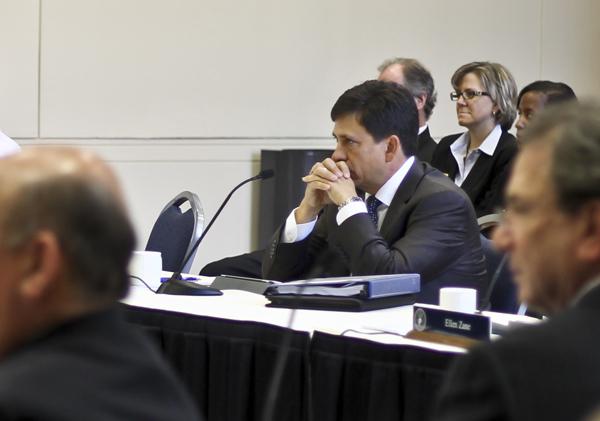Some faculty say they are alarmed that the Board of Trustees and administrators are overlooking professors’ role in governing the University, leaving them out of decisions about the faculty code and online courses.
Charles Garris, an engineering professor and chair of the professional ethics and academic freedom committee, will submit a resolution at Friday’s senate meeting, arguing that a task force that is revising the faculty code this year should submit their work to his committee and the senate for review before the Board votes to adopt it.
The code outlines rules like tenure and promotion, firings and academic freedom.

The small flashes of power struggle come after top administrators eased concerns from professors by involving them in plans to expand GW to China last month. The senate and top administrators had mostly worked in lockstep over the last few years, with few tensions flaring.
Garris said the code calls for faculty participation when rewriting it, and said they have been included each time the code was revised in at least the last 50 years. By submitting the resolution, Garris said he is trying to prevent a situation in which the Board could limit how much say faculty have in University policies, he said.
“I think the administration is not following the spirit of the faculty code, and I think that’s what people are bothered about,” Garris said. “But on the other hand, it could be rectified.”
Economics professor Donald Parsons said Board chair Nelson Carbonell did not respond to faculty concerns from September when he spoke of his plans at the Faculty Assembly two weeks later. He called it a fundamental change for the Board not to include the Faculty Senate in code revisions, which they have historically played a role in forming.
“I see this as moving this a step up to make sure that the trustees themselves don’t misunderstand the gravity of what chair Carbonell is doing,” Parsons said.
Carbonell told faculty at a University-wide faculty meeting in October that the Board wanted to update the code as GW prepared to act on its 10-year strategic plan, but did not outline specific rule changes. The code last underwent a major revision in 2004.
In September, he said a task force of board members and faculty would hold meetings with professors in the fall to discuss changes to the code. He said they hoped to have recommendations in December or January.
“You may be skeptical and there’s nothing I can do about that, but the Board would like to make sure we have looked at this and there’s alignment,” Carbonell said at the meeting.
He told faculty that the Board had “no desire to create an adversarial process,” adding that he did not think it would become a conflict.
Garris said faculty could face a similar situation Friday, when Provost Steven Lerman will disucss a new policy regarding the administration’s accessibility of online courses.
The provost’s office announced last week that administrators could give auditors and outside researchers access to online course materials “at its discretion.”
In an email obtained by The Hatchet, Phil Wirtz, vice dean of programs and education in the GW School of Business, objected to the policy because it was created without faculty input and professors would have no “knowledge that such surveillance is occurring.”
“This would appear to be a clear trampling of Faculty rights,” he wrote.
Paul Schiff Berman, vice provost for online education and academic innovation, said the University made the move was reason to streamline the compliance process the University must follow legally and for accreditation.
“Sometimes this access must be granted on an expedited basis, making it not feasible to track down every faculty member that may be involved in order to get individualized permission, and since these are legal or accreditation requirements, it is not something that is optional in any event,” he said in an email.







